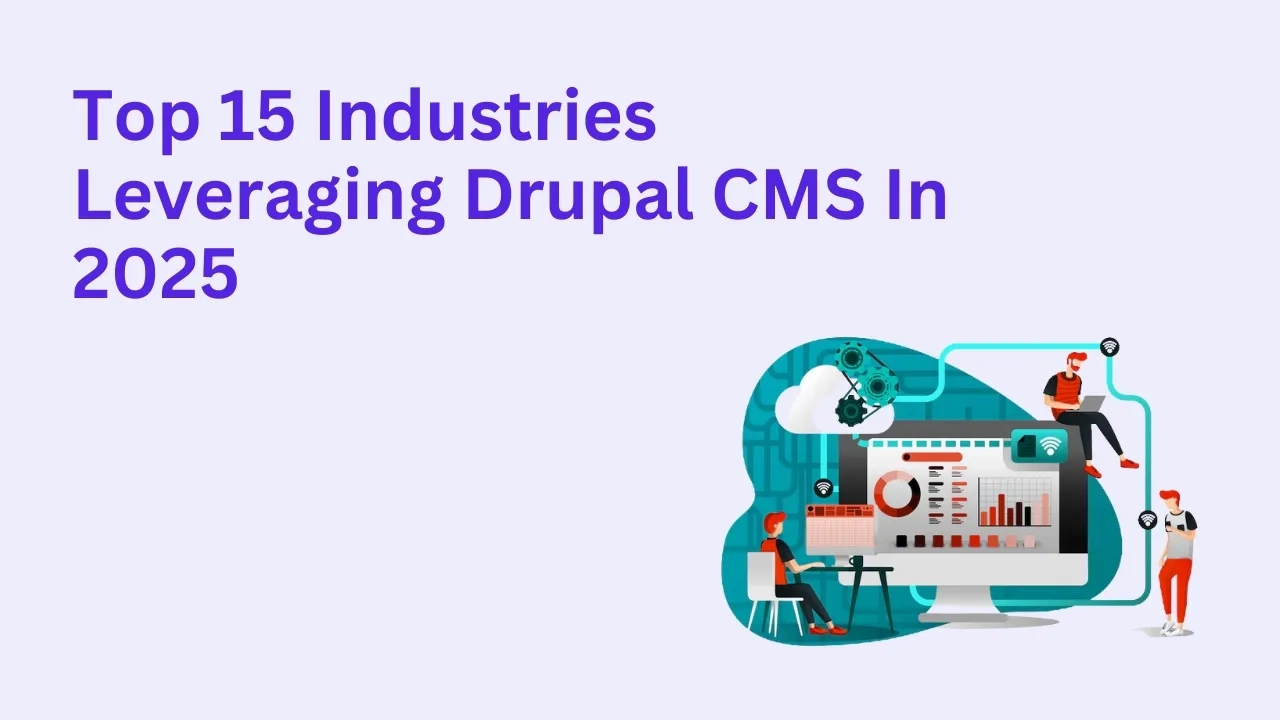Top 15 Industries Leveraging Drupal CMS in 2025

Drupal has cemented itself as one of the most flexible and secure content management systems in the enterprise world. In 2025, as organizations seek platforms that can handle personalization, data governance, scalability, and headless architecture, Drupal is becoming a preferred choice across a wide spectrum of industries.
Below are the top 15 industries where Drupal isn't just being adopted—it's helping businesses scale, innovate, and stay ahead.
1. Healthcare
Healthcare organizations are choosing Drupal for its strong security, compliance capabilities (including HIPAA alignment), and custom workflows that power patient portals, appointment scheduling, and multilingual health education content.
Drupalify offers robust Drupal solutions for healthcare that include integration with EHRs, advanced access control, and modular content structures for different service lines.
2. Higher Education
Universities, colleges, and online learning platforms need powerful content management across departments, campuses, and programs. Drupal's multi-site capabilities, role-based publishing workflows, and accessibility readiness make it a standout.
If you're part of a college or academic institution, explore how Drupal for higher education can simplify content publishing and digital engagement.
3. B2B & Technology Companies
B2B firms rely on structured lead generation, gated content, and CRM integrations. Drupal makes it easier to manage complex buyer journeys across multiple personas and funnels, all while enabling performance at scale.
Our Drupal solutions for B2B are designed to support product marketing teams, event-driven campaigns, and partner portals within a unified system.
4. Government & Public Sector
Government agencies need WCAG-compliant, secure, multilingual platforms to serve citizens. Drupal is widely used in the public sector because it supports open standards, structured content, and strict access controls.
5. Financial Services
From banking and insurance to fintech startups, financial institutions use Drupal for secure, scalable platforms with regulatory compliance baked in. Custom dashboards, member logins, and integrations with financial tools are easily handled.
6. Media & Publishing
Publishers need to manage dynamic content types, multimedia, and real-time editorial workflows. Drupal excels at editorial UX, bulk publishing, and supporting large-scale media platforms with integrated monetization.
7. E-commerce
With integrations like Drupal Commerce, the CMS offers custom product catalogs, flexible checkout flows, and personalized shopping experiences. It’s especially beneficial for B2B or complex sales models needing more than a typical storefront.
8. Nonprofits & NGOs
Nonprofits often require donor engagement, multilingual advocacy content, and event promotion—all managed with limited resources. Drupal delivers these features cost-effectively without license fees, while supporting integrations with CRMs like Salesforce.
9. Real Estate
Real estate firms use Drupal to create rich property listings, agent dashboards, and advanced search filters. It allows tight integration with MLS platforms and location-based personalization for site visitors.
10. Travel & Hospitality
From destination sites to hotel booking platforms, Drupal enables complex content structures, multilingual support, and interactive tools like itinerary builders. The flexibility to integrate third-party APIs for maps, reviews, and payments is a big plus.
11. Legal Services
Drupal allows law firms to maintain secure document repositories, dynamic team directories, and client access portals. Its ability to control content visibility and build practice-area-specific landing pages makes it ideal for this sector.
12. Professional Associations & Membership Organizations
Associations use Drupal for membership portals, gated content, conference microsites, and continuing education platforms. Its strong role-based content control helps manage members, partners, and the public under one umbrella.
13. Automotive Industry
Automotive manufacturers and dealers rely on Drupal for model showcases, dealer locators, and regional microsites. The ability to create localized content for various dealerships while maintaining global brand control is key.
14. Retail & Consumer Brands
Brands aiming to manage campaign content, regional websites, and omnichannel product promotion use Drupal for its reusable components and integration capabilities. It empowers marketing teams to rapidly spin up new promotions without dev bottlenecks.
15. Telecommunications
Telecom companies use Drupal to power customer support portals, product configurators, and self-service experiences. Its ability to scale and handle high traffic volumes makes it a smart choice for digital-first providers.
Why These Industries Prefer Drupal in 2025
The organizations listed above all share similar requirements: scalable infrastructure, secure content delivery, multilingual capabilities, and seamless integration with business systems. Drupal offers:
Granular access control for editors, marketers, and admins
API-first architecture for headless builds and decoupled frontends
Multisite and multilingual support from the core
Security and performance proven at government and enterprise levels
A thriving global open-source community constantly improving the platform
Want to see how Drupal fits your vertical? Browse our complete overview of Drupal industry solutions to find a path that aligns with your business goals.
Final Thoughts
Drupal’s rise across sectors in 2025 is no accident. It's a platform that solves real challenges—whether you're building a complex university portal, launching a healthcare website, or supporting global B2B marketing campaigns.
If your industry demands content flexibility, technical depth, and long-term scalability, Drupal is a strong investment. And at Drupalify, we specialize in aligning Drupal builds with the real-world needs of your sector.
Let’s discuss what your industry needs and how Drupal can support it.








